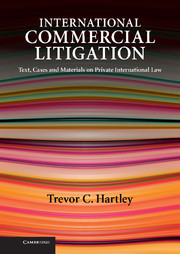Book contents
- Frontmatter
- Contents
- Table of panels
- List of figures
- Preface
- Acknowledgments
- Terminology
- Table of Latin phrases
- List of abbreviations
- Table of cases
- Table of cases (European Court of Justice, numerical order)
- Table of legislative instruments
- PART I STARTING OFF
- PART II JURISDICTION
- PART III FOREIGN JUDGMENTS
- PART IV PROCEDURE
- PART V CHOICE OF LAW
- 22 Introduction to choice of law
- 23 Torts
- 24 Contracts: the principle of party autonomy
- 25 Contracts: legal policy and choice of law
- 26 Contracts: regulating business, protecting employees and helping consumers
- 27 Foreign currency
- 28 Property: tangible movables
- 29 Contractual rights and property interests – I
- 30 Contractual rights and property interests – II
- 31 Contractual rights and property interests – III
- PART VI EXTRATERRITORIALITY
- Bibliography
- Index
24 - Contracts: the principle of party autonomy
from PART V - CHOICE OF LAW
- Frontmatter
- Contents
- Table of panels
- List of figures
- Preface
- Acknowledgments
- Terminology
- Table of Latin phrases
- List of abbreviations
- Table of cases
- Table of cases (European Court of Justice, numerical order)
- Table of legislative instruments
- PART I STARTING OFF
- PART II JURISDICTION
- PART III FOREIGN JUDGMENTS
- PART IV PROCEDURE
- PART V CHOICE OF LAW
- 22 Introduction to choice of law
- 23 Torts
- 24 Contracts: the principle of party autonomy
- 25 Contracts: legal policy and choice of law
- 26 Contracts: regulating business, protecting employees and helping consumers
- 27 Foreign currency
- 28 Property: tangible movables
- 29 Contractual rights and property interests – I
- 30 Contractual rights and property interests – II
- 31 Contractual rights and property interests – III
- PART VI EXTRATERRITORIALITY
- Bibliography
- Index
Summary
Introduction
Freedom of contract is an important legal principle. Giving effect to it involves determining whether the parties reached agreement, and what it was they agreed to. It also involves filling in the gaps in their agreement and deciding what to do if they fail to carry it out. In all these matters, the policy of the law should be to give effect to what the parties intended or would have intended if they had considered the matter. As far as choice of law is concerned, this policy involves determining the system of law that they might reasonably have expected to apply. The purpose of choice-of-law rules in this area should be to identify this system.
There is, however, another aspect of the law of contract. In some situations, the law is not concerned with discovering what the parties intended (or might have intended). Its purpose is to override their intention: it prohibits them from agreeing to certain terms or imposes certain terms on them. This is done either to protect the weaker party or to give effect to some governmental policy. Consumer-protection rules are an example of the former; export embargoes adopted for foreign-policy reasons are an example of the latter. These are sometimes called mandatory rules. Where they are in issue, it makes no sense to select the applicable law on the basis of the intention, actual or presumed, of the parties: their intention is not relevant.
- Type
- Chapter
- Information
- International Commercial LitigationText, Cases and Materials on Private International Law, pp. 566 - 598Publisher: Cambridge University PressPrint publication year: 2009



